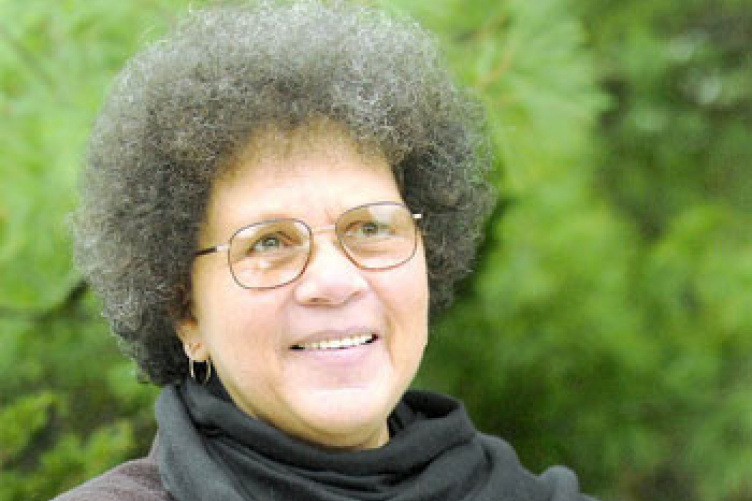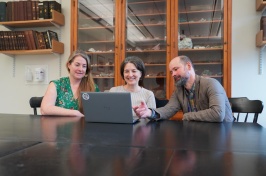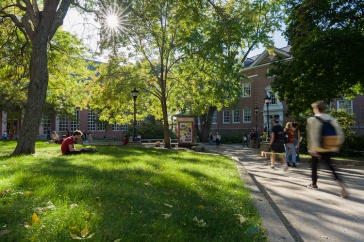
Historian Valerie Cunningham will receive a Granite State Award at this year's commencement. The annual award is given in recognition of outstanding contributions to the state. Cunningham is credited with being the inspiration behind the creation of Portsmouth's Black Heritage Trail. A past recipient of the Sen. Edward M. Kennedy Social Justice Award, Cunningham was named a Restore America Hero by the National Trust for Historic Preservation and HGTV Restore America in 2008.
You have been active in recounting black history in Portsmouth. What is your history there?
The black population of Portsmouth was about the same proportion (when she growing up) as it is today. In fact, the black population of the seacoast area has remained within 2-4 percent of the total since Africans and black Americans were enslaved by the early European settlers.
I was one of two black kids in all my classes K-6, then usually the only person of color in my classes. Of course, there were other black students in the schools, just not many in any one classroom, so my experience was not unique. I was one of five black graduates from Portsmouth High School in 1959.
Although, prior to the Civil Rights Law of 1964, there was "red lining" around such housing areas as Panaway Manor prohibiting black people to own or rent a home there and de facto segregation prohibited blacks from many types of employment and public accommodations, black people did rent and own housing throughout the city, so there was no identifiable "black" neighborhood.
The center of social life was the People's Baptist Church, later reformed as New Hope Baptist Church, where then as now the black community gathered for weddings, christenings, funerals, concerts, plays and political events, although some black people were members of and worshiped in other (predominantly white) churches.
How were you involved in the creation of Portsmouth's Black Heritage Trail?
I began researching the history of New Hampshire and northern New England more than 50 years ago. Because I lived in Portsmouth and those public records were easily accessible to me at that time, that is where I focused my attention. By 1995, I had accumulated enough information for the formation of a group of volunteers to organize the information into what was to become known as the Portsmouth Black Heritage Trail.
We were incorporated as a nonprofit organization and, after 17 years, we have identified 24 black history sites within the city of Portsmouth, supported the identification and research of other New Hampshire sites including Greenland, Exeter, Newmarket, Nashua, Manchester, Milford, Concord, Andover, Canaan and Warner. Also, we have supported and advised black history activities in Kittery, Eliot, York and Portland, Maine. Our activities expanded to include historic preservation, teacher institutes, curriculum development, public symposia, concerts and plays, and docent training for historic house museums.
My interest and research has never been limited to Portsmouth; it spans the period from colonial slavery to the modern Civil Rights Movement across northern New England. I also offer group tours to these black history sites and beyond, including New Bedford, Martha's Vineyard and the Berkshires, to our sister city in Ghana and, next, a tour of black Paris, France. All of the tours reflect historical connections to New Hampshire.
By 1996, I had accumulated a substantial amount of information, making it possible to collaborate with Mark Sammons in writing our first book, "The Portsmouth Black Heritage Trail Resource Book." We were pleased and ready when invited to follow that with the updated and completely revised version, "Black Portsmouth: Three Centuries of African American Heritage," published by the University Press of New Hampshire in 2004.
You received a National Treasure Award. Tell me about that.
The "Restore America Hero" award is presented at a formal dinner at the Library of Congress by the National Trust for Historic Preservation and HGTV. Its purpose is to inspire people from all walks of life to restore a historic landmark or get involved in the revitalization of a historic neighborhood that is part of our American heritage. I was the recipient in 2008 for my efforts to raise awareness of black heritage across the region and, in particular, by marking black historic sites in Portsmouth, and for the preservation of New Hampshire's first African-American church.
Have you always had an interest in history?
I had very little interest in local or general history in school. However, I was always fascinated by the storytelling of my parents and their friends, recounting their life experiences and I was an ambitious reader of a wide range of subjects. As I became more aware that African-American history has been omitted from public education, I was compelled to find that history, especially here in New Hampshire. It was during those explorations that I began to appreciate the connections of history to the present. I also came to appreciate that who is telling the story makes a difference.
Originally published by:
UNH Today
Written by Jody Record, UNH Media Relations.
-
Written By:
Jody Record ’95 | Communications and Public Affairs | jody.record@unh.edu






















































